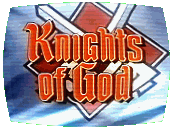 Julia is barely able to stop Gervase from committing suicide (per Mordrin’s conditioning), though what breaks that conditioning is Julia accidentally putting her own life at risk. Gervase saves her, and with the aid of the monks, they set out for Anglia to put Gervase on the throne. Somehow aware that Gervase’s conditioning has been broken, Mordrin finally goes insane, and prepares to install himself as King. Gervase and Julia arrive, now accompanied by Arthur, Owen, Julia’s father, and the combined force of resistance fighters and many former Knights of God who no longer follow either Hugo or Mordrin. As Gervase is declared King in a live radio broadcast, Hugo’s forces strike at the heart of Mordrin’s headquarters; the two remaining factions of Knights and the resistance fight a massive three-way battle on those grounds. Owen is mortally wounded by Hugo, but Mordrin kills Hugo and tries to escape, crown in hand, still planning his own ascension to the throne until he’s killed by the dying Owen. With both of their leaders fallen, the Knights scatter or surrender. Arthur crowns Gervase and tasks him with ruling more wisely than those who have perished.
Julia is barely able to stop Gervase from committing suicide (per Mordrin’s conditioning), though what breaks that conditioning is Julia accidentally putting her own life at risk. Gervase saves her, and with the aid of the monks, they set out for Anglia to put Gervase on the throne. Somehow aware that Gervase’s conditioning has been broken, Mordrin finally goes insane, and prepares to install himself as King. Gervase and Julia arrive, now accompanied by Arthur, Owen, Julia’s father, and the combined force of resistance fighters and many former Knights of God who no longer follow either Hugo or Mordrin. As Gervase is declared King in a live radio broadcast, Hugo’s forces strike at the heart of Mordrin’s headquarters; the two remaining factions of Knights and the resistance fight a massive three-way battle on those grounds. Owen is mortally wounded by Hugo, but Mordrin kills Hugo and tries to escape, crown in hand, still planning his own ascension to the throne until he’s killed by the dying Owen. With both of their leaders fallen, the Knights scatter or surrender. Arthur crowns Gervase and tasks him with ruling more wisely than those who have perished.
written by Richard Cooper
directed by Andrew Morgan
music by Christopher GunningCast: George Winter (Gervase), Claire Parker (Julia), John Woodvine (Mordrin), Nigel Stock (Simon), Julian Fellowes (Hugo), Frank Middlemass (Father Gregory), Patrick Troughton (Arthur), Gareth Thomas (Owen), Shirley Stelfox (Beth), Barrie Cookson (Brigadier Clarke), Michael Sheard (Doctor), Peter Childs (Tyrell), Dean Harris (Brother Dean), Owen Teale (Dai)
Notes: Brigadier Clarke broadcasts Gervase’s speech on “Radio 3 Britain” (though it’s almost certainly due to the series airing on ITV, there’s an easy story justification for this, as the BBC likely didn’t survive the civil war). The end credit music is different for this episode, as is the flowing flag in the background of the credits: for the previous 12 episodes, the Knights of God flag has flown during the credits, while the British Union Jack appears here, accompanied by more triumphant, less oppressive music.
LogBook entry by Earl Green
